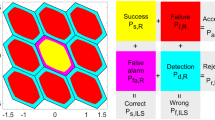Abstract
Satellite elevation angle and Signal-to-Noise Ratio (SNR) are usually used as measurement quality indicators for global navigation satellite system (GNSS) measurements. The relationship of quality indicators and accuracies of measurements can be expressed as stochastic models. To model the relationship for Beidou navigation satellite system (BDS) and global position system (GPS), five basic stochastic models are presented from satellite elevation angle and SNR. Also, coefficients of these models are refined. It’s found that SNR stochastic models with same coefficients can’t treat all measurements from BDS and GPS. Moreover, stochastic models with an additive constant could model the relationship better. The performance of the five models are tested, independent and combined, in BDS/GPS precise positioning. The results show that refined stochastic models could improve the success rate of integer ambiguity single-epoch solution 8 % comparing to empirical models. Models with an additive constant could improve the success rate 10 % comparing to models without additive constants. SNR model with an additive constant performs better in performance for integer ambiguity resolution, especially for low elevation satellite or combined system. Using stochastic models with an additive constant, ratios of posteriori and prior variances are closer to 1 in precise positioning. Therefore, for the used receivers, we suggest to choose refined stochastic models with an additive constant, and give priority to SNR model. Here, a refinement and assessment method is proposed to derive proper stochastic models for GNSS data processing, taking into account the differences between navigation satellite systems (e.g. BDS and GPS) and stochastic models.
Access this chapter
Tax calculation will be finalised at checkout
Purchases are for personal use only
Similar content being viewed by others
References
Brown N, Kealy A et al (2002) Stochastic modelling of GPS phase observations for improved quality estimation. Cartography 31(2):143–151
Brunner FK, Hartinger H et al (1999) GPS signal diffraction modelling: the stochastic SIGMA-Δ model. J Geodesy 73(5):259–267
Collins JP, Langley RB (1999) Possible weighting schemes for GPS carrier phase observations in the presence of multipath. Final contract report for the US Army Corps of Engineers Topographic Engineering Center, no. DAAH04-96-C-0086/TCN 98151
Deng C, Tang W et al (2013) Reliable single-epoch ambiguity resolution for short baselines using combined GPS/BeiDou system. GPS Solutions 18(3):375–386
Hartinger H, Brunner FK (1999) Variances of GPS phase observations: the SIGMA-ɛ model. GPS Solutions 2(4):35–43
Jin S, Wang J et al (2005) An improvement of GPS height estimations-stochastic modeling. Earth Planets Space 57(4):253–259
Langley RB (1997) GPS receiver system noise. GPS World 8(6):40–45
Li B, Shen Y et al (2008) Assessment of stochastic models for GPS measurements with different types of receivers. Chin Sci Bull 53(20):3219–3225
Luo X (2013) GPS stochastic modelling. Springer, Berlin
Luo X, Mayer M et al (2011) Verification of ARMA identification for modelling temporal correlations of GNSS observations using the ARMASA toolbox. Stud Geophys Geod 55(3):537–556
Odolinski R, Teunissen PJ et al (2013) Quality analysis of a combined COMPASS/BeiDou-2 and GPS RTK positioning model. Methodology 5(1176.45):25.48
Odolinski R, Odijk D et al (2014) Combined GPS and BeiDou instantaneous RTK positioning. Navigation 61(2):135–148
Odolinski R, Teunissen PJG et al (2014) First combined COMPASS/BeiDou-2 and GPS positioning results in Australia. Part II: single- and multiple-frequency single-baseline RTK positioning. J Spat Sci 59(1):25–46
Ozludemir MT (2004) The stochastic modeling of GPS observations. Turk J Eng Environ Sci 28:223–231
Satirapod C (2006) Stochastic models used in static GPS relative positioning. Surv Rev 38(299):379–386
Satirapod C, Wang J (2000) Comparing the quality indicators of GPS carrier phase observations. Geom Res Australasia 73:75–92
Satirapod C, Wang J et al (2003) Comparing different global positioning system data processing techniques for modeling residual systematic errors. J Survey Eng 4(129):129–135
Tang W, Deng C et al (2013) Triple-frequency carrier ambiguity resolution for Beidou navigation satellite system. GPS Solutions 18(3):335–344
Teunissen PJG, Odolinski R et al (2013) Instantaneous BeiDou+GPS RTK positioning with high cut-off elevation angles. J Geodesy 88(4):335–350
Tiberius CCJM, Kenselaar F (2000) Estimation of the stochastic model for GPS code and phase observables. Surv Rev 35(277):441–454
Tiberius C, Jonkman N et al (1999) The stochastics of GPS observables. GPS World 10(2):49–54
Wang J (2001) Modelling and quality control for precise GPS and GLONASS satellite positioning. Curtin University of Technology, Perth
Wang J, Stewart MP et al (1998) Stochastic modeling for static GPS baseline data processing. J Surv Eng 124(4):171–181
Wieser A, Brunner FK (2000) An extended weight model for GPS phase observations. Earth Planets Space 52(10):777–782
Xin Xiang Jin CDDJ (1996) Relationship between satellite elevation and precision of GPS code observations. J Navig 49(2):253–265
Acknowledgments
This study is supported by 2013 doctoral innovation fund in Southwest Jiao Tong University and the fundamental research funds in Central Universities.
Author information
Authors and Affiliations
Corresponding author
Editor information
Editors and Affiliations
Rights and permissions
Copyright information
© 2015 Springer-Verlag Berlin Heidelberg
About this paper
Cite this paper
Li, Y., Dingfa, H., Meng, L., Dongwei, Z. (2015). BDS/GPS Stochastic Model Refinement and Assessment Using Satellite Elevation Angle and SNR. In: Sun, J., Liu, J., Fan, S., Lu, X. (eds) China Satellite Navigation Conference (CSNC) 2015 Proceedings: Volume I. Lecture Notes in Electrical Engineering, vol 340. Springer, Berlin, Heidelberg. https://doi.org/10.1007/978-3-662-46638-4_48
Download citation
DOI: https://doi.org/10.1007/978-3-662-46638-4_48
Published:
Publisher Name: Springer, Berlin, Heidelberg
Print ISBN: 978-3-662-46637-7
Online ISBN: 978-3-662-46638-4
eBook Packages: EngineeringEngineering (R0)




